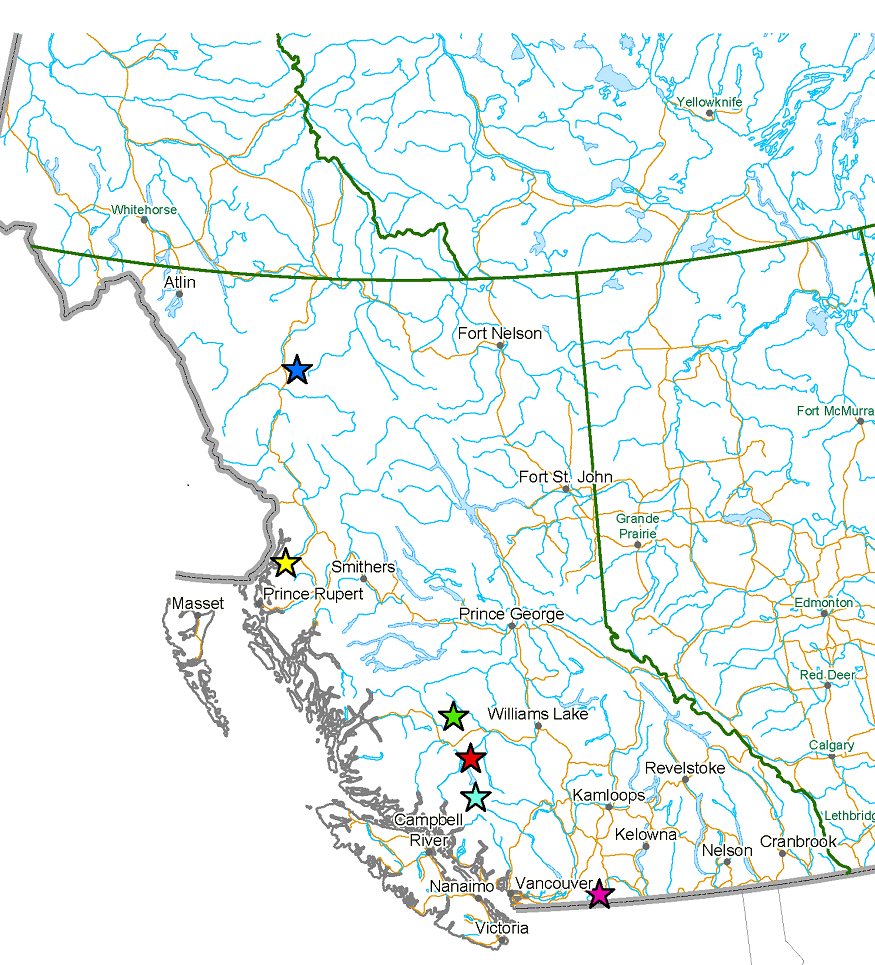Together For Wildlife Scholarship
The Together for Wildlife scholarship is awarded annually to 10 master’s and Ph.D. candidates conducting research that will have a positive impact on stewardship, management, policy, or decision-making of wildlife in B.C.
The aim of this scholarship is to support reconciliation and collaboration, diversity of perspectives, and building community among Indigenous communities and rural areas of B.C.
2024
On July 25, The Habitat Conservation Trust Foundation (HCTF), in partnership with the First Nations-B.C. Wildlife and Habitat Conservation Forum and the British Columbia government, announced the 2024 Together for Wildlife Scholarship recipients.
The 10 scholarship recipients are:
- Landon Birch - Master’s, University of British Columbia - Okanagan
- Mitchell Brunet - Doctorate, University of British Columbia - Okanagan
- Tristen Brush - Master’s, University of British Columbia
- Alexia Constantinou - Doctorate, University of Victoria
- Westin Creyke - Master’s, University of Northern British Columbia
- Siobhan Darlington - Doctorate, University of British Columbia - Okanagan
- Isabel Deutsch - Master’s, University of Victoria
- Paige Monteiro - Master’s, Simon Fraser University
- Larisa Murdoch - Master’s, Thompson Rivers University
- Megan Roxby - Master’s, Simon Fraser University
For more information on the T4W scholarship you can visit the HCTF scholarship page, or view the recipients announcement on the HCTF blog.
2023
The Habitat Conservation Trust Foundation (HCTF), in partnership with the First Nations-B.C. Wildlife & Habitat Conservation Forum and the Province of British Columbia’s Together for Wildlife Initiative (T4W), are proud to announce the recipients for the 2023 Together for Wildlife academic scholarships:
- Alexia Constantinou
- Harry Yiduo Zhang
- Jamie Clarke
- Jeffrey Nishima-Miller
- Julia Bizon
- Lindsay Whitehead
- Megan Winand
- Persia Khan
- Tyler Jessen
- Westin Cryke
For more information on the recipients and their research visit the HCTF 2023 recipients page.
2022
Together for Wildlife (T4W) and the Interior University Research Coalition have announced the recipients of their 2022 student research grants. As announced in May 2022, six grants of $25,000 each are being provided to university graduate students to help guide effective wildlife stewardship in B.C. and support the goals of the T4W strategy.
The six projects are located in different regions of the province and address a range of priority topics.

![]()
Anna Santo (University of British Columbia) will work with the Southern Grizzly Bear Stewardship Steering Committee on the design and implementation of a stakeholder and rights-holder consultation process. The intent of this work is to understand and support communities that could be affected by grizzly bear recovery efforts and to develop a process that is transferable to other wildlife recovery projects.
![]()
Jeff Nishima-Miller (University of British Columbia - Okanagan) is collaborating with the Xeni Gwet’in community on Indigenous-led wildlife management, with the purpose of advancing the design and implementation of its wildlife management strategy. A critical component of this work will be the weaving together of Xeni Gwet’in and western scientific knowledge to determine wildlife management practices that can help drive successful outcomes for wildlife, habitat, and Indigenous well-being.
![]()
Katie Tjaden-McClement (University of British Columbia) will be investigating whether a large population of feral horses living on the Chilcotin Plateau is competing for habitat and resources with native moose and mule deer. Research outcomes will inform feral horse management practices to help support native species. This project is being undertaken in partnership with Southern Dakelh Nation Alliance, Tŝilhqot'in National Government, Ulkatcho First Nation, and the B.C. government.
![]()
Levi Oostenbrink (University of British Columbia - Okanagan) will be working in collaboration with the Tŝilhqot'in National Government and the B.C. Ministry of Forests to quantify the impacts of boat-based bear viewing and human activity, salmon abundance and habitat quality on grizzly bear presence and daily activity patterns. Results from this project will help support wildlife and bear management plans of the Tŝilhqot'in National Government and inform bear viewing regulations and policies being developed by the B.C. Ministry of Forests.
![]()
Spencer Greening (Simon Fraser University) will be undertaking interdisciplinary research that explores Indigenous resource and wildlife management by narrating the Gitga’at First Nation’s historical relationship with the Laxgalts’ap watershed. Oral histories and traditional harvesting methods, rituals and laws will be used to collaborate and contrast current western methods of managing ecosystems. This research will provide a better understanding of how Indigenous knowledge can improve our understanding of people’s relationship with the natural world and how that knowledge is applicable to Canadian laws and policies.
![]()
Westin Creyke (University of Northern British Columbia) will be investigating the impacts of an active resource road on a wildlife corridor used by Stone sheep in the Dome Mountain area of the Tahltan Territory. He will be working to define the extent of the road’s influence on stress in the Stone sheep population and identifying other variables, such as food availability, that could be impacting the animals’ stress levels. The findings will generate information that can be used by the project partner (the Tahltan Central Government) in the management of road activity and sheep habitat in its territory.
